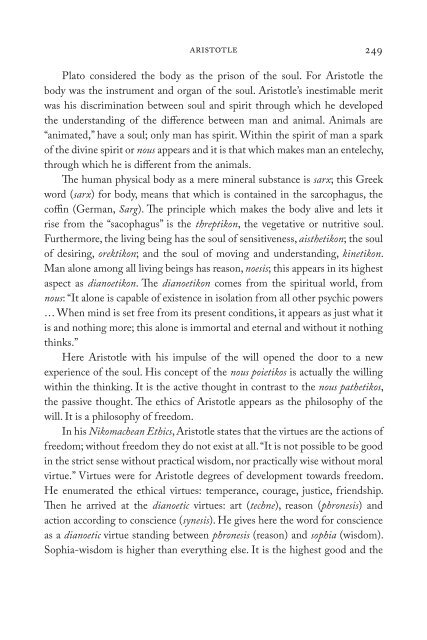The Gospel of Hellas - Research Institute for Waldorf Education
The Gospel of Hellas - Research Institute for Waldorf Education
The Gospel of Hellas - Research Institute for Waldorf Education
You also want an ePaper? Increase the reach of your titles
YUMPU automatically turns print PDFs into web optimized ePapers that Google loves.
aristotle<br />
Plato considered the body as the prison <strong>of</strong> the soul. For Aristotle the<br />
body was the instrument and organ <strong>of</strong> the soul. Aristotle’s inestimable merit<br />
was his discrimination between soul and spirit through which he developed<br />
the understanding <strong>of</strong> the difference between man and animal. Animals are<br />
“animated,” have a soul; only man has spirit. Within the spirit <strong>of</strong> man a spark<br />
<strong>of</strong> the divine spirit or nous appears and it is that which makes man an entelechy,<br />
through which he is different from the animals.<br />
<strong>The</strong> human physical body as a mere mineral substance is sarx; this Greek<br />
word (sarx) <strong>for</strong> body, means that which is contained in the sarcophagus, the<br />
c<strong>of</strong>fin (German, Sarg). <strong>The</strong> principle which makes the body alive and lets it<br />
rise from the “sacophagus” is the threptikon, the vegetative or nutritive soul.<br />
Furthermore, the living being has the soul <strong>of</strong> sensitiveness, aisthetikon; the soul<br />
<strong>of</strong> desiring, orektikon; and the soul <strong>of</strong> moving and understanding, kinetikon.<br />
Man alone among all living beings has reason, noesis; this appears in its highest<br />
aspect as dianoetikon. <strong>The</strong> dianoetikon comes from the spiritual world, from<br />
nous: “It alone is capable <strong>of</strong> existence in isolation from all other psychic powers<br />
… When mind is set free from its present conditions, it appears as just what it<br />
is and nothing more; this alone is immortal and eternal and without it nothing<br />
thinks.”<br />
Here Aristotle with his impulse <strong>of</strong> the will opened the door to a new<br />
experience <strong>of</strong> the soul. His concept <strong>of</strong> the nous poietikos is actually the willing<br />
within the thinking. It is the active thought in contrast to the nous pathetikos,<br />
the passive thought. <strong>The</strong> ethics <strong>of</strong> Aristotle appears as the philosophy <strong>of</strong> the<br />
will. It is a philosophy <strong>of</strong> freedom.<br />
In his Nikomachean Ethics, Aristotle states that the virtues are the actions <strong>of</strong><br />
freedom; without freedom they do not exist at all. “It is not possible to be good<br />
in the strict sense without practical wisdom, nor practically wise without moral<br />
virtue.” Virtues were <strong>for</strong> Aristotle degrees <strong>of</strong> development towards freedom.<br />
He enumerated the ethical virtues: temperance, courage, justice, friendship.<br />
<strong>The</strong>n he arrived at the dianoetic virtues: art (techne), reason (phronesis) and<br />
action according to conscience (synesis). He gives here the word <strong>for</strong> conscience<br />
as a dianoetic virtue standing between phronesis (reason) and sophia (wisdom).<br />
Sophia-wisdom is higher than everything else. It is the highest good and the

















